Lee Upton, Francis A. March Professor of English and writer-in-residence, reflects on teaching and writing career
By Stephen Wilson
As a young writer, Lee Upton was once given an unhelpful critique: “I think that you will have a future where you’ll only see your work published on the backs of cereal boxes. In your own handwriting.”
Rather than feeling insulted, she became curious.
“At the time I felt largely a sense of wonderment,” she says. “Cereal boxes: What would it be like to write on cereal boxes?”
If the breakfast industry tapped the Francis A. March Professor of English and writer-in-residence on the shoulder, cereal boxes would be flying off the shelves.
Consider her career: two books of short fiction, six collections of poetry, four volumes of literary criticism, one novella, one book of essays, three collaborative art books, and one libretto.
Prolific to say the least. Beyond her body of work, she has stood in the classroom since 1986, teaching young adults how to turn a phrase, enjamb a line, and craft dialogue.
She reflects on her lives, both at the writer’s desk and teacher’s lectern, as she closes out her career after 32 years.
Take me back to 1986. You have just completed your Ph.D. and landed at Lafayette for a year as a visiting assistant professor. Describe for me the place, the work, and you as a teacher and writer.
The colleagues were wonderfully welcoming, and the students tended to be eager to learn and uncommonly polite. (There’s nothing like the shock of watching people take notes while you talk—I don’t think I’ve ever gotten over that.) In 1986, I lived in downtown Easton and didn’t have a car, and so I’d walk up the hill in every weather—and I remember how lucky and excited I felt to be teaching on such a beautiful campus with such spirited colleagues. I was working on my second book of poetry and taking the bus into New York to do research in the Berg Collection of the New York Public Library for what would become my first book of literary criticism. Because there wasn’t a tenure-track line open in my scholarly area, I left Lafayette to take a tenure-track position at a college in my home state of Michigan. When a tenure-track line opened at Lafayette the following year, I immediately applied, hopeful that I might have the chance to return.
Tell me how things changed over the years on campus, with students, and in Easton.
So much has changed—the technology on campus, our curriculum, and the city of Easton, which has become a haven for many visual artists. I’m reluctant to make sweeping generalizations, but one of the most important changes has been in our English department curriculum in terms of writing in multiple genres. When I arrived on campus, only one creative writing course was on the books. We now have a sequence of creative writing courses at the introductory, intermediate, and advanced levels, as well as constellations of courses devoted to writing practice, including courses in screenwriting, humor writing, television writing, creative nonfiction, environmental writing, academic writing, journalistic writing, professional writing, and much more. We’ve been bringing to campus even more writers in recent years, and we’ve developed a vital writing culture through the efforts of colleagues across campus.
Talk about some of those classes. Which were you most happy to see added based on what you wanted to teach or students were hungry to learn?
I want my students to surprise themselves, to experience new perceptions and insights and even newly vivid sensations through the process of writing. The joy of being a writer, the exhilaration, emerges from meeting the challenge that writing poses. To entertain unfamiliar perspectives, to imagine dynamic worlds that aren’t yet created and to honor our best impulses—all that can happen in a writing course.
As we’ve rotated courses I’ve been able to teach throughout the creative writing sequence: the introductory course, intermediate workshops in poetry and in fiction, and the advanced courses in both major genres. One of the joys of teaching in the sequence is seeing some of the same students return and further extend their imaginative reach and develop an enhanced capacity to experiment. The students become more discerning, empathetic, generous, and sensitive readers.
In all my courses, I want students to experience how much work a sentence can do, including how the craft of writing might tell us about unexamined and dehumanizing assumptions. I also want students to think about the ways in which their writing might lodge in the reader’s or listener’s memory. A phrase can stick in the memory for a very long time. In one of my classes, probably at least 25 years ago, a student talked about wrestling and said, “The other guy smelled like bacon.” How could any of us forget that?
Statements made by the poet Jane Cooper stay with me: “A poem is a living experience in which we, poet and reader, participate together. A partnership.” She said, “A poem…is a means of practicing freedom.” That sort of partnership and that practice of freedom occur in multiple genres, and I want that experience for all my students.
Many of our students have gone on to successful and impressive writing careers, among them MK Asante ’04, Katherine Bogden ’06, Anthony Caleshu ’92, Ross Gay ’96, Leslieann Hobayan ’95, Carole Mirakove ’93, Daniel Reynolds ’08, Leslie Jones Sysko ’97, Yolanda Wisher ’98—to name only a few. I must have taught thousands of students by now and wish I could thank each of them.
I’ve found such satisfaction in teaching, whether literature or writing courses. Several years ago I developed the Humor Writing course, and teaching it was one of those experiences that are pretty much undiluted joy. Humor works on principles that are similar to those of much strong writing: overturning expectations, puncturing taboos, being fiercely attentive to one’s culture and political life, and favoring specific language over spongy bureaucratic language—unless you’re making fun of that language.
Humor is also dangerous and powerful, as Mark Twain famously noted: “Against the assault of laughter nothing can stand.” And as Mel Books points out, humor is dependent on context: “Tragedy is when I cut my finger. Comedy is when you fall into an open sewer and die.”
Students who took Humor Writing learned to be bold. Over the years every single student who took that course eventually wrote pieces that were laugh-out-loud funny and revealing. Those students inspired me. (If any of my former students remembers not being funny, please don’t tell me now.)
What has it meant to work with such a talented range of writing faculty?
My colleagues Mikael Awake, Megan Fernandes, and Jennifer Gilmore are also specialists in creative writing, and I feel lucky and privileged to work with them and with my other dedicated and innovative colleagues in the English department in a range of specialty areas.
I’ve also had the incredible opportunity to collaborate in art projects with colleagues at Lafayette or formerly associated with Lafayette, including my English department colleague, the choreographer and dancer Carrie Rohman, and with colleagues from art: Ed Kerns, Curlee Holton, Jim Toia, Thom Cooney Crawford, and Berrisford Boothe; and from music, composer Kirk O’Riordan.
It has been a great privilege to teach our students and to work with colleagues in my department and across campus. Lafayette is rich in writers of all sorts. I’ve been extraordinarily fortunate. Although I’m leaving teaching to write full time, I’ll still be working with other writers and will be supportive of our alumni, and I look forward to having coffee and talking about writing with my colleagues, my friends.
As for the guests, who stands out strongly in your memory as being most personally and/or professionally impactful?
As for the writers we’ve brought to campus … there have been so many. By my count, through our department, at least 80 have come to campus since I arrived. So many left strong impressions. I especially remember the visit by the fiction writer George Saunders—his almost incandescent kindness. Any discussion with him was full-hearted and compassionate. Some of his stories that he read at Lafayette were so funny that listeners shrieked.
I also remember with great fondness the 20th anniversary of the MacKnight Black Poetry Reading in which the poet Paul Muldoon, who inaugurated the first reading, returned once again to read his poetry in 2014. For that year’s celebration we also invited back a few of our alumni poets: Ross Gay, Leslieann Hobayan, Leslie Jones Sysko, and Yolanda Wisher. It was such a happy occasion to see our former students together—such energetic, immensely talented poets.
When did you make the commitment to life as a writer?
As a young child I believed that writing books was something done by very dead people from the grave. Writing poetry or fiction didn’t seem like anything anyone I knew would be fortunate enough to do. I read a good deal as a child, and as soon as I realized that actual living human beings wrote the stories I read, I wanted to be one of those authors, although I never imagined that anything I wrote would be published in a book. I learned, though, to make my living by writing. I worked my way through college by taking a number of jobs, including writing feature articles for a newspaper in Michigan. It was wonderful in many ways—to have the license to ask strangers all sorts of questions and to learn to write to a deadline. I was paid per article and eventually stopped doing any other jobs except for freelance writing, and that’s how I managed to afford my groceries, rent, and tuition.
Describe your writing process, both what it has been and how it has evolved.
When my children were small I attempted to establish a routine, but daily life, then and now, kept getting in the way. No days are quite the same for me. I write daily and for long as I can whenever I have the opportunity. Writing gives me such pleasure—amid the inevitable frustration that difficult projects pose—and so I leap at the chance to write. If I did have an ideal routine and my days were entirely open, it would look like this: two hours in the morning for poetry, a reading break, followed by an afternoon devoted to writing fiction; then, at night, perhaps I’d work on research and essays. One reason I like to write in multiple genres: When I’ve exhausted my work in one genre for the day, I can move on to another.
How do you follow what appears as you write, in other words, follow what you are discovering?
For longer fiction I make notes first. I may even make simple drawings—sketches—of the characters and the setting to try to gain traction. Often I don’t have a clear sense of the work until I’ve written several drafts. I outline along the way to make more visible to myself what’s on the page/screen. Even when I outline a plot in fiction or an argument in nonfiction, the outline is only partial. For poems, I never make a plan. I let the lines unfold, often through many drafts. If a piece in any genre doesn’t surprise me, it won’t live.
The books and essays I’ve written about writers have tended to be about disregarded or well-known but misread figures. I feel compassion for what those writers endured. And that compassion leads me to research their work to gain a more quickened sense of what makes each author distinctive.
How do you help students discover and trust their “voice”?
Our voices give us away. I like to think that we all have many voices—and so students need to tap into the voices already at their disposal. Students need to be exposed to a broad range of voices in writing and in spoken word performances until they find work that excites them. Our texts are anthologies, individual collections, audios, literary journals, and writing by others in the course. The internet provides a wealth of material from different cultures and eras. It’s also essential for emerging writers to realize that they’re widening the possibilities of the genre through the voices from their generation. They need to be alert to one another’s voices, to hear the stories around them. Often, to generate appreciation for voices, I create dialogue exercises. Asking students to write dialogue gives them an opportunity to create friction between characters.
How do you teach this skill as each student displays a different degree of talent and drive?
Talent isn’t static. It’s discovered and rediscovered. The act of writing gives the writer courage as the process becomes its own reward, even—as the writer matures and seeks to publish—in the face of rejection.
It’s impossible to know what the future holds for a writer in terms of talent. I often think of a workshop in which I was enrolled as an undergraduate. Some students disparaged one of the men in the course as untalented. He was humble. He wrote and revised and wrote and revised—with patience. He was among those in the course who eventually saw his work published. His detractors didn’t continue as writers. Their cruelty to him may have been what they eventually internalized about themselves.
In recent years I’ve often required students to read their work aloud in front of the class each week. After each reading we applaud the writer for the courage to get up before the room and read something that matters. The course creates an audience for the writer, and having a receptive audience can bring out a writer’s desire to become a stronger, more fluent, more daring writer.
Describe a successful critique in class.
Workshops: They’re a delicate art for all involved.
A successful critique scrambles the codes, opening up the work so that the writer can respond freshly to the draft. A good session isn’t prescriptive. The workshop elicits questions and encourages a deeper sense of commitment in the writer to discover more about what the work under discussion has to offer.
In any workshop a writer may receive some advice that is flatfooted and wrong, but even bad advice—to a writer with an open mind—may loosen the writer’s fixed perspective. Knowing what to cut in a draft can be as helpful as knowing what to add. In turn, a good workshop can train writers to respect readers without disrespecting their own intelligence and instincts.
What advice do you give/offer them that you think is foundational?
I often think of that movie in which Al Pacino, playing the devil, asks, “What’s the worst vice? Advice.” But, yes, I give advice, and here’s some of it:
Reading isn’t passive; it’s generative. Read multiple times anything that fascinates you or perplexes you so that you can discover how effects are achieved. Recognize that craft isn’t neutral or innocent; persuasion is involved in the author’s choices. The language we encounter may restrict our thinking, forcing us into well-worn channels, or liberate us.
You’re creating an experience for readers, and everything counts, not only your research, your expectations and assumptions, your perceptions, your memories, your facility with syntax, juxtapositions, and sound effects—but also every comma and the empty space on the page, and more. But that’s what’s exciting.
Don’t believe your life is too dull to draw upon for inspiration. Any experience, if closely rendered in precise and evocative language, is worth preserving in writing. You haven’t mined your life’s contradictions and beauties yet.
Listen to how words are used by your family of origin. What words and expressions are meaningful in your family? Draw energy and inspiration from that source, whether painful or joyful or both.
Don’t think your sense of humor can’t live in serious work. Having a sense of humor is serious business.
No revision is wasted. In the spirit of experimentation you’re re-envisioning your work, applying pressure to what you’ve written. Yet sometimes during revision we can cancel our best discoveries, out of squeamishness or fear or because we haven’t yet developed a way to approach the matter we’re working our way toward. That’s why it’s important to keep all your drafts so you can see the route you traveled and if you ever stepped off the more promising path. Revision can mean even starting over again, with all the new knowledge you’ve accumulated through the process of writing other drafts. Trust yourself and realize that new selves, new voices, new insights are waiting to be discovered through the act of revision.
Imaginative writing takes energy from depicting and enacting flaws in sensory, specific images; our bad habits and worries are fodder for creative writing. What’s imperfect is what’s intriguing. You can put your fears, worries, embarrassing encounters to work in your writing. At last, high school can pay off.
You are a writer and reader for life. Whether you decide to attempt to publish your writing or read your work in public or not, writing and reading will enhance and enlarge your life and connect you to others from across cultures and across time. You’re never alone in this great enterprise.
How do you balance teaching and writing?
Precariously. In the spirit of improvisation. And with gratitude.
Tell me about retirement. What are your plans?
I’ll be writing full time. I have projects in poetry, fiction (long and short forms), and creative nonfiction that I’ve been working on, and new projects that I’ve been longing to develop.
What would you like to say to the students, colleagues, and College as you leave?
I’m more grateful than I can even begin to express. It’s been a tremendous privilege to teach at Lafayette and to work with so many gifted and admirable people. Thank you. I’ll never forget how wildly, wickedly lucky I’ve been.
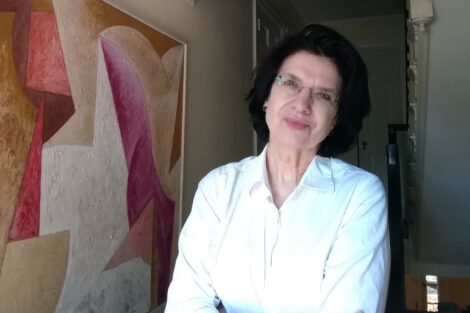
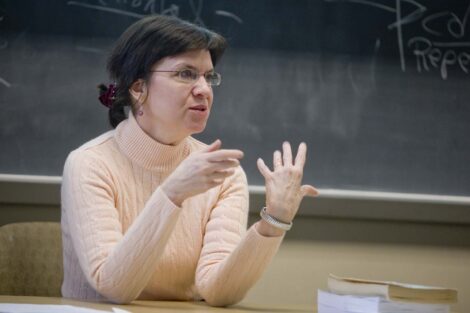
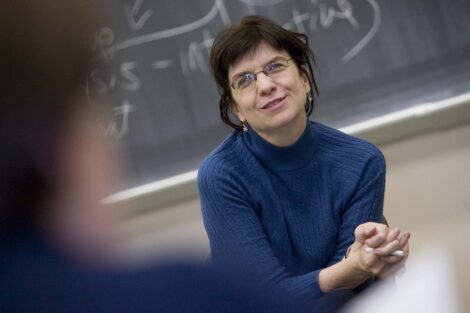
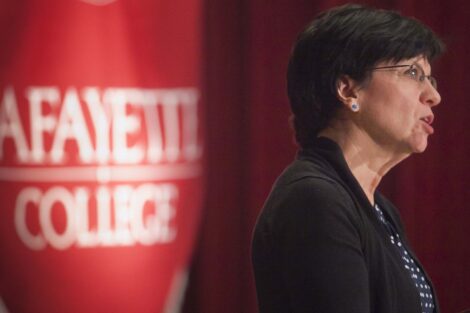
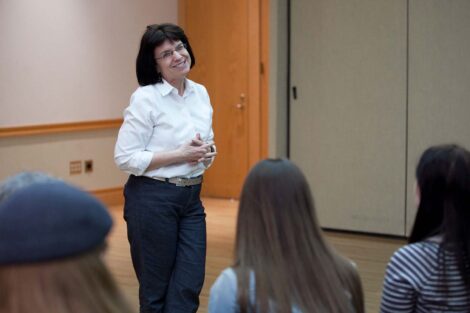
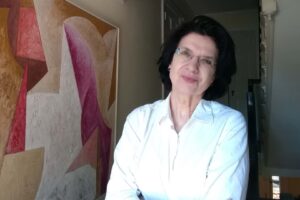
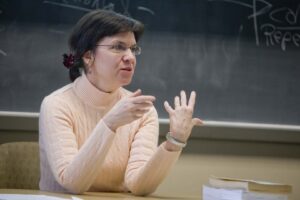

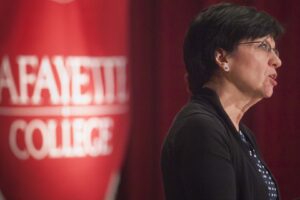
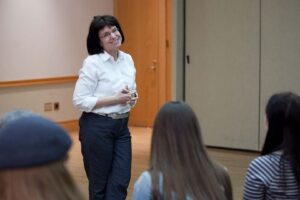
3 Comments
Congratulations to you, Lee, from someone who recognized your talent many years ago with the publication of “Small Locks.” We were so young and so much has happened, but I still remember those couple of times we met. I am not at all surprised by the great things you have accomplished. Never stop.
A congratulatory note from the old days in East Lansing.
Best wishes and stay safe.
Congrats and best wishes in the coming years
Comments are closed.